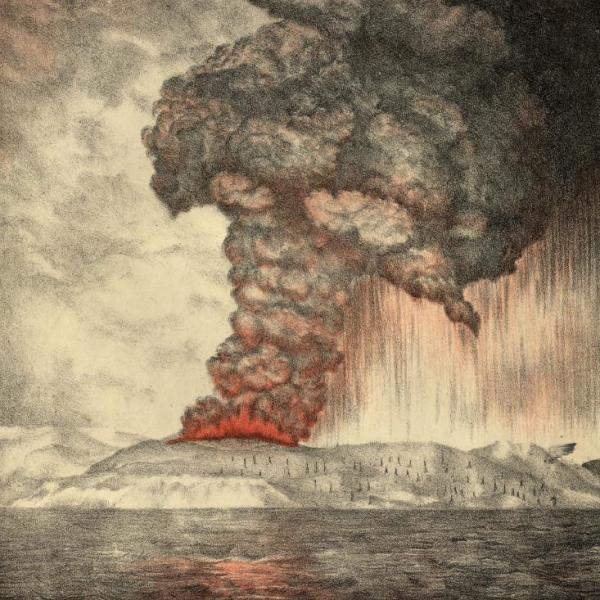The Sound So Loud That It Circled the Earth Four Times

The 1883 eruption on Krakatoa may be the loudest noise the Earth has ever made.
On August 27, 1883, the Earth let out a noise louder than any it has made since.
It was 10:02 a.m. local time when the sound emerged from the island of Krakatoa, which sits between Java and Sumatra in Indonesia. It was heard 1,300 miles away in the Andaman and Nicobar islands (“extraordinary sounds were heard, as of guns firing”); 2,000 miles away in New Guinea and Western Australia (“a series of loud reports, resembling those of artillery in a north-westerly direction”); and even 3,000 miles away in the Indian Ocean island of Rodrigues, near Mauritius (“coming from the eastward, like the distant roar of heavy guns.”)1 In all, it was heard by people in over 50 different geographical locations, together spanning an area covering a thirteenth of the globe.
Think, for a moment, just how crazy this is. If you’re in Boston and someone tells you that they heard a sound coming from New York City, you’re probably going to give them a funny look. But Boston is a mere 200 miles from New York. What we’re talking about here is like being in Boston and clearly hearing a noise coming from Dublin, Ireland. Traveling at the speed of sound (766 miles or 1,233 kilometers per hour), it takes a noise about four hours to cover that distance. This is the most distant sound that has ever been heard in recorded history.

A map showing the area in which the Krakatoa explosion could be heard.
So what could possibly create such an earth-shatteringly loud bang? A volcano on Krakatoa had just erupted with a force so great that it tore the island apart, emitting a plume of smoke that reached 17 miles into the atmosphere, according to a geologist who witnessed it. You could use this observation to calculate that stuff spewed out of the volcano at over 1,600 miles per hour—or nearly half a mile per second. That’s more than twice the speed of sound.
This explosion created a deadly tsunami with waves over 100 feet (30 meters) in height. One hundred sixty-five coastal villages and settlements were swept away and entirely destroyed. In all, the Dutch (the colonial rulers of Indonesia at the time) estimated the death toll at 36,417, while other estimates exceed 120,000.2,3
The British ship Norham Castle was 40 miles from Krakatoa at the time of the explosion. The ship’s captain wrote in his log, “So violent are the explosions that the ear-drums of over half my crew have been shattered. My last thoughts are with my dear wife. I am convinced that the Day of Judgement has come.”

A lithograph of the massive 1883 eruption of Krakatoa.
In general, sounds are caused not by the end of the world but by fluctuations in air pressure. A barometer at the Batavia gasworks (100 miles away from Krakatoa) registered the ensuing spike in pressure at over 2.5 inches of mercury. That converts to over 172 decibels of sound pressure, an unimaginably loud noise. To put that in context, if you were operating a jackhammer you’d be subject to about 100 decibels. The human threshold for pain is near 130 decibels, and if you had the misfortune of standing next to a jet engine, you’d experience a 150-decibel sound. (A 10-decibel increase is perceived by people as sounding roughly twice as loud.) The Krakatoa explosion registered 172 decibels at 100 miles from the source. This is so astonishingly loud, that it’s inching up against the limits of what we mean by “sound.”
When you hum a note or speak a word, you’re wiggling air molecules back and forth dozens or hundreds of times per second, causing the air pressure to be low in some places and high in other places. The louder the sound, the more intense these wiggles, and the larger the fluctuations in air pressure. But there’s a limit to how loud a sound can get. At some point, the fluctuations in air pressure are so large that the low pressure regions hit zero pressure—a vacuum—and you can’t get any lower than that. This limit happens to be about 194 decibels for a sound in Earth’s atmosphere. Any louder, and the sound is no longer just passing through the air, it’s actually pushing the air along with it, creating a pressurized burst of moving air known as a shock wave.
Оставить комментарий
Для комментирования необходимо войти через
![]() Вконтакте
Вконтакте